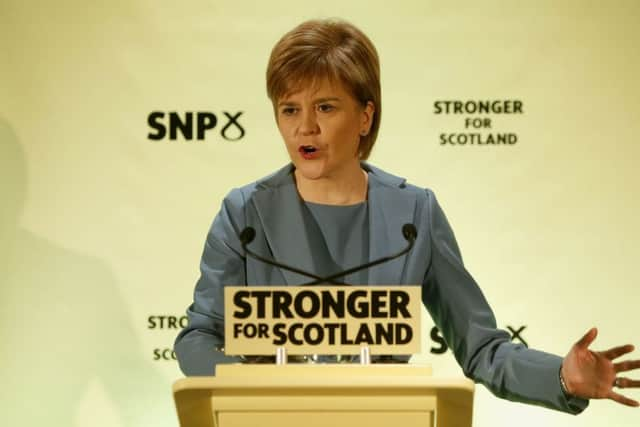Ewan Crawford: SNP aim remains the same


Despite being a believer in Scottish independence for as long as I can remember, probably the most revolutionary act I have committed is wearing a jumper emblazoned with the Disney character, Pluto, on the House of Commons terrace.
I was eight years old at the time and oblivious to the fact that I wasn’t treating the mother of parliaments with the sartorial respect that some of the glances towards me suggested I should have.
Advertisement
Hide AdAdvertisement
Hide AdI still have a photo of the occasion, sitting beside my dad, who (without any cartoon characters on his suit) had just been elected as one of the SNP’s 11 MPs in the October 1974 election.


My father actually had a claim to more radical behaviour than anything I have done. Back in the 1960s the decision of a Glasgow Academy and Cambridge educated son of the Manse to jeopardise a secure career and throw in his lot with the Nationalists was at best a curiosity and more likely seen, by many of his peers, as the act of a crank.
But being more interested in the fortunes of both Hearts and the march of Ally MacLeod’s army in the 1970s (sorry to bring that up) I took little notice of the attempts by the SNP’s first substantial group of MPs to influence UK government policy.
With less than a week to go before the current election it seems the SNP is on course to better that previous best ever result for a Westminster contest of 41 years ago.
This prospect has prompted two, conflicting, forms of opposition analysis, over what the consequences might be for both the party and the UK.
On the one hand there is the line that the SNP will march on Westminster intent on wrecking the system, the government, the tea rooms and even – courtesy of the Conservatives (UK branch) – stealing money from the back-pockets of people in England. All this apparently with the cunning aim of whipping up tensions between Scotland and Westminster which will magically lead to independence.
The other is that if SNP MPs work in a progressive alliance which finds favour with mainstream opinion in Scotland, that will make demands for independence less, rather than more, likely.
The first shows an almost comic misunderstanding of SNP strategy. Senior figures in the party have long understood that if you are to be a credible advocate of further devolution (and independence) then you need to be in the business of building confidence, not chaos.
Advertisement
Hide AdAdvertisement
Hide AdBack in 2003, after a disappointing Holyrood election, there were indeed some internal voices suggesting that a little more SSP-style politics was required to seize the initiative. But the issue for the SNP then was not that most people felt the SNP was insufficiently revolutionary but that the party was not yet ready for government.
The patient task of convincing voters that an SNP-administration would bring tangible improvements to their lives was both far less exciting but far more important.
The second line of analysis is more relevant in one sense. The SNP is indeed clearly interested in working with Labour, and others, to bring about progressive change. During the referendum campaign the Yes side went out of its way to stress common ground with traditional Labour values.
Scottish Labour, by contrast, is now testing to destruction the theory that negative campaigning works.
They’ve bounced around between the “vote SNP-get Tory” mantra, followed by apocalyptic warnings about the apparent devastation that would follow if full tax and welfare powers were devolved and what really amounts to a “six-days to save the Labour Party” campaign based on the fantasy idea that when Nicola Sturgeon says a vote for the SNP next week is not a mandate for a further referendum, she has in fact a secret plan hidden in her heels to announce a new independence vote on Friday.
But tellingly during Question Time on Thursday night the UK leader Ed Miliband decided it simply didn’t matter what his Scottish colleagues were saying.
Mr Miliband signed, sealed and delivered Scottish Labour’s branch office status by seeming to declare he would rather see a Tory government in power than do a deal with the SNP.
Reality, of course, may still kick in, if on Friday morning it is clear no party has won an overall majority and the business of forming a government begins. What then are the longer-term implications of all this for the SNP, Scotland and the UK?
Advertisement
Hide AdAdvertisement
Hide AdThe most important point here, which I’ve recognised from working for the SNP during both good and bad times, is that caught up in daily political combat, all parties tend to overestimate the extent to which they alone can shift public opinion.
Back in the early 2000s with debate in Scotland dominated by the cost of the new parliament building and question marks over the overall performance of Holyrood, it was clearly difficult going for the SNP – no matter how brilliant (or otherwise) we may have been.
The task for sensible parties is to demonstrate to people that you can be trusted, are on their side, that you are competent and have a principled programme to achieve your aims – in the SNP’s case to bring about a more equal society and competitive economy. That will maximise the chances of success when conditions are more favourable.
In the current political context where there is uncertainty about who will form the next UK government, many people are voting SNP because they believe the party will promote and protect Scottish interests.
At some point there will be renewed popular demand for independence – which will only come about if the movement is seen as a collective, inclusive national endeavour.
In those circumstances a party with a track record of co-operation and of achievement in bringing about social and economic change is likely to be rewarded. This is something that SNP understands, even if its opponents still have some way to travel.